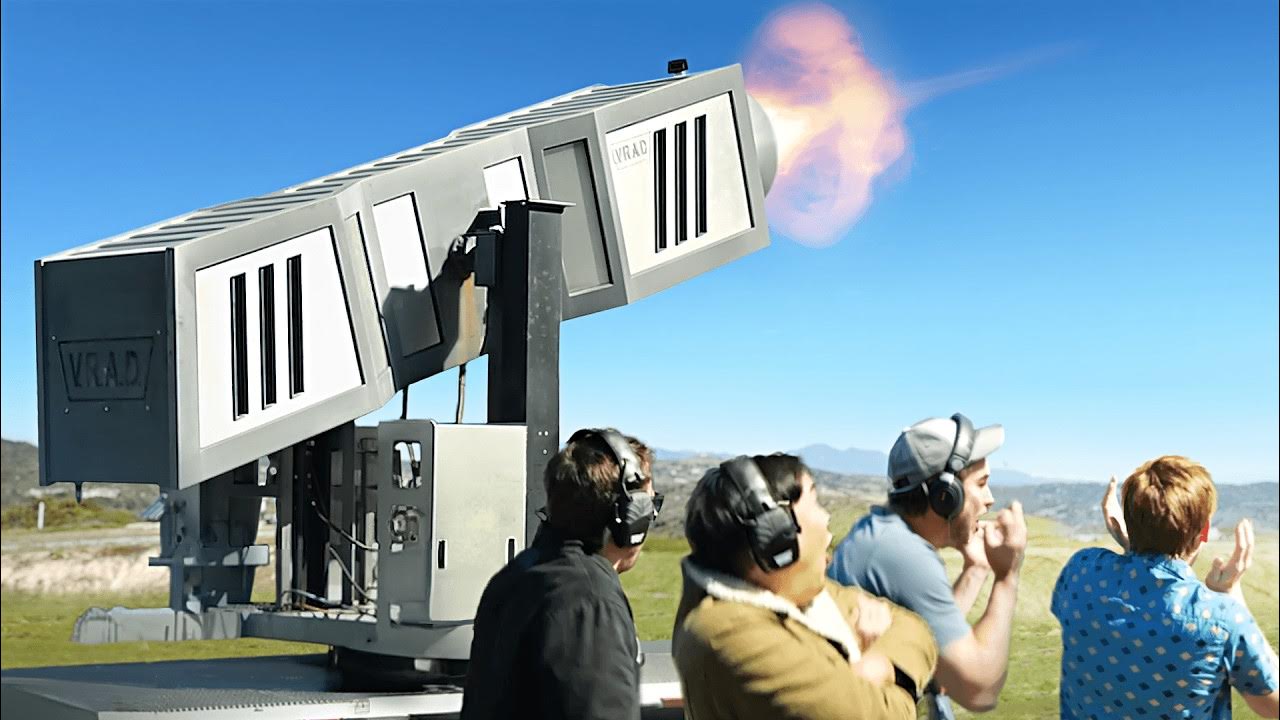I’ve enjoyed Mark Rober’s videos for a while now. They are fun, touch on accessible topics, and have decent production value. But this recent video isn’t sitting right with me
The video is here: https://www.youtube.com/watch?v=SrGENEXocJU
In it, he talks about a few techniques for how to take down “bad guy drones”, the problems with each, and then shows off the drone tech by Anduril as a solution.
Anduril aims to sell the U.S. Department of Defense technology, including artificial intelligence and robotics. Anduril’s major products include unmanned aerial systems (UAS), counter-UAS (CUAS), semi-portable autonomous surveillance systems, and networked command and control software.
In the video, the Anduril product is a heavy drone that uses kinetic energy to destroy other drones (by flying into them). Quoting the person in the video:
imagine a children’s bowling ball thrown at twice as fast as a major league baseball fastball, that’s what it’s like getting hit by Anvil
This technology is scary for obvious reasons, especially in the wrong hands. What I also don’t like is how Mark Rober’s content is aimed at children, and this video includes a large segment advertising the children’s products he is selling. Despite that, he is promoting military technology with serious ethical implications.
There’s even a section in the video where they show off the Roadrunner, compare it against the patriot missiles, and loosely tie it in to defending against drones. While the Anvil could be used to hurt people, at least it is designed for small flying drones. The Roadrunner is not:
The Roadrunner is a 6 ft (1.8 m)-long twin turbojet-powered delta-winged craft capable of high subsonic speeds and extreme maneuverability. Company officials describe it as somewhere between an autonomous drone and a reusable missile. The basic version can be fitted with modular payloads such as intelligence and reconnaissance sensors. The Roadrunner-M has an explosive warhead to intercept UAS, cruise missiles, and manned aircraft.



At range sure, nearby though an open choke shotgun would be pretty viable. Skeet shooting has been a thing for a while and unless it can change direction between the trigger and the pellets reaching it the drone’s likely at least impaired.
Skeet/trap shooting was designed around duck hunting. Ducks aren’t particularly acrobatic flyers. Even fat, heavy quadcopters like off the shelf DJI stuff can do some impressive maneuvers, and purpose built racing quads are wicked. If the operator tries a little to do some evasive maneuvers, or the autopilot has it programmed in, it’s going to be very hard to shoot down.
Shotguns also aren’t common on the battlefield. They’re not that useful for typical army engagement ranges. Navy vessels do use them for boarding actions, but you usually won’t find them in armies.
Here is an alternative Piped link(s):
off the shelf DJI stuff
Piped is a privacy-respecting open-source alternative frontend to YouTube.
I’m open-source; check me out at GitHub.
How nearby is nearby though? And, in the context of the proposed use case for defending a crowded stadium in a populated area, does this put people down range as well that could also be impaired by the pellets?
The optimal sweet spot is probably like 40 meters or something, within 20 or 10 meters and the drone is probably in range to drop a grenade or explode, and becomes much harder to hit because it’s capable of making much quicker direction changes relative to where you’re standing even as it presents a larger target to you as a consequence of being closer, and a whole lot farther out, and birdshot can’t really cut it.
Edit: Oh I was also gonna say, for indoor spaces, it’d maybe be not a good idea even just for hearing protection, but barring that, you could just opt for something lower velocity which you’d probably pack for this occasion if you’re defending a set location, and then just load what you need in like 2 seconds. I imagine most drones are going to be flying around above head height anyways, so the main worry would be debris and falloff. You can’t prevent debris from the drone really unless you have a net drone or something, and the falloff on the backend of a lower velocity or frangible birdshot with less mass is probably not super consequential except maybe in the case of eye protection. Some sort of ceramic bullet or maybe even steel bbs would probably work without doing too much damage. More than a drone, anyways. It’s not as though a drone that rams into another drone is a particularly safe thing, in any case.
Crowded spaces it’s a problem, I was more talking to notion of just plain shooting them rather than a use case. A rifle would be dang near impossible, but a scattered spray, you really only need to stop one prop and it’s probably on the ground for a standard 4 prop deal. At least mine got real screwy when a blade split mid flight.
Edit: It also could be noted that while a lot of pellets would miss, they would pose a lot less risk that a rifled bullet coming back down. The weight of an individual shot pellet is a fraction of the weight of a bullet, so less momentum, plus the don’t have a ballistic spin to maintain their speed that a rifle round does. Basically someone shooting a shot round in the air would come down with about as much force as a handful of gravel once the air resistance slows it a bit.